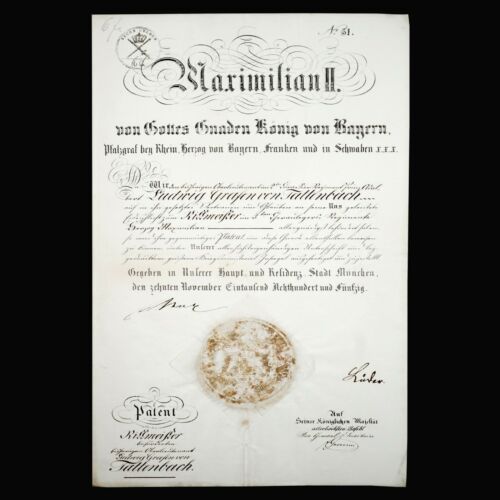-40%
King Maximilian Joseph II Signed Royal Military Commission Appointment Document
$ 422.39
- Description
- Size Guide
Description
For your consideration is a genuine c. 1850 hand-signed Royal manuscript document signed by Maximilian II Joseph (1811-1864), King of Bavaria. This royalty document is personally hand-signed in bold black ink by King Maximilian II Joseph of Bavaria, c.1850. Condition is excellent. Unmounted and unframed. Provenance: private collection.Maximilian II, (born Nov. 28, 1811, Munich—died March 10, 1864, Munich), king of Bavaria from 1848 to 1864, whose attempt to create a “third force” in German affairs by an alliance of smaller states led by Bavaria, foundered on the opposition of the two dominant states, Prussia and Austria, and of the German parliament.
Maximilian, the eldest son of King Louis I and Therese of Saxe-Hildburghausen, received a thorough education at Göttingen and Berlin. He inclined to intellectual pursuits for the rest of his life, surrounding himself with scholars and artists, most notable among them the historian Leopold von Ranke.
With the abdication of his father (March 1848), Maximilian succeeded to the throne at a time of revolutionary fervor throughout Germany. His proposal of a triad, a league of smaller territories as a counterweight to the two large conservative German states, was opposed not only by Austria and Prussia, but by the Frankfurt National Assembly, whose efforts were directed toward a single, unified German state. Although Prussia aided Bavaria in the suppression of a revolt in the Palatinate (1849), Maximilian refused an alliance with the northern power. In fact, with the elevation of Ludwig von der Pfordten to the post of chief minister (1849), Bavaria assumed a pro-Austrian stance.
On his accession, the King liberalized Bavarian life through the introduction of freedom of the press and ministerial responsibility, although he preferred to leave politics in the hands of his ministers. He made Munich a center of Germany’s intellectual and artistic life, calling many notable scholars to the Bavarian capital. Departments of the sciences, technology, and history were established at the Bavarian Academy of Sciences and research projects initiated. The King kept in close personal touch with his intellectual acquaintances, the latter even occasionally serving as advisers on policy matters.
Maximilian firmly backed the hereditary prince Frederick of Augustenburg in the long dispute over the duchies of Schleswig and Holstein, which again erupted in the early 1860s between Denmark and Prussia. His aggressive stand was not supported by the other European powers. He died before the German states were able to settle the issue by force.
The Kingdom of Bavaria (German: Königreich Bayern; Austro-Bavarian: Kinereich Bayern) was a German state that succeeded the former Electorate of Bavaria in 1805 and continued to exist until 1918. The Bavarian Elector Maximilian IV Joseph of the House of Wittelsbach became the first King of Bavaria in 1805 as Maximilian I Joseph. The crown would go on being held by the Wittelsbachs until the kingdom came to an end in 1918. Most of Bavaria's present-day borders were established after 1814 with the Treaty of Paris, in which Bavaria ceded Tyrol and Vorarlberg to the Austrian Empire while receiving Aschaffenburg and Würzburg. With the unification of Germany into the German Empire in 1871, the kingdom became a federal state of the new Empire and was second in size, power, and wealth only to the leading state, the Kingdom of Prussia. In 1918, Bavaria became a republic, and the kingdom was thus succeeded by the current Free State of Bavaria.




















